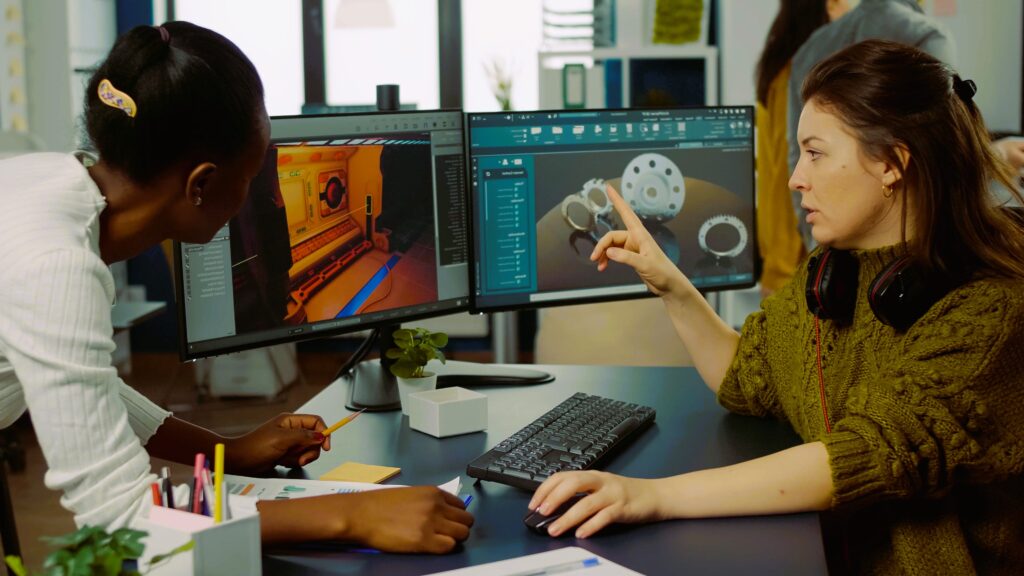Alright, let’s get this out of the way first: who hasn’t dreamed of getting paid to play video games? I mean, come on. Imagine telling people, “Yeah, I play games for a living.” Sounds like something out of a dream, right? Well, I’m here to tell you that this dream? It’s totally doable. And I’m not talking about just being some random guy who gets to test a few bugs. I’m talking about seriously making money while doing what you love. Let’s break down how you can go from “just a gamer” to a video game tester and start earning some cash.
What is a Video Game Tester, Anyway?
Let’s get this clear first—being a video game tester isn’t all about just playing through a game and having fun. Yeah, you get to play games (obviously), but your job is to dig deep and break things. You are the one who finds bugs, glitches, and issues before the public even lays eyes on it. Developers rely on you to find those frustrating problems that could make a game totally unplayable.
But here’s the kicker—you don’t have to be some super genius coder or have a computer science degree to get into this. You just need to be dedicated, observant, and passionate about gaming. Plus, the skills you build in this gig? They’re more transferable than you might think.
How to Get Started as a Game Tester

If you’re ready to turn your gaming passion into a paycheck, follow these steps, and you’ll be on your way. You ready? Let’s go.
1. Level Up Your Knowledge of Games 🎮
First things first, you need to know games inside and out. Not just the gameplay, but also the mechanics, features, and different genres. The more familiar you are with the way games work, the easier it’ll be to spot issues.
- Play a variety of genres: FPS, RPG, MOBA, RTS. Test your skills and knowledge across the board.
- Understand game design: Learn about things like user interface, mechanics, and game flow. The more you know, the better your feedback will be. Did you like the article? Read also the article about from Unity to Unreal Engine.
2. Get Some Experience 🕹️
You’re not gonna land a big testing job straight out the gate (unless you’re super lucky). But don’t sweat it—everyone has to start somewhere. Here’s how you can get your feet wet:
- Join beta tests: Many developers offer open beta tests to the public. Sign up, play the game, and report bugs. Not only does this get you experience, but it also shows potential employers you’ve got the chops to do this.
- Volunteer for indie games: Indie game developers are always looking for testers to help with their projects. Getting involved with smaller teams is a great way to build up a portfolio.
3. Build a Portfolio 📁
Once you’ve got some experience, start creating a portfolio. This doesn’t need to be fancy, but it’ll show your future employers you’re serious about this gig.
- Document your feedback: Create a list of bugs you’ve reported in past games, along with detailed descriptions of the issues and the steps to reproduce them.
- Track your testing sessions: Keep a record of the games you’ve tested, the problems you’ve found, and the fixes you’ve suggested.
4. Look for Legit Job Opportunities 💼
Now that you’ve got some experience and a portfolio, it’s time to look for gigs. And here’s the thing: there are tons of opportunities out there if you know where to look.
- Game studios: Big companies like EA, Ubisoft, and Activision Blizzard regularly hire testers for their AAA titles. These gigs usually require you to work in-office, but they come with some decent paychecks.
- Freelance websites: If you’re looking for more flexibility, check out websites like Upwork, Freelancer, or Fiverr. Many indie developers look for freelance testers to help them out.
- Job boards: Keep an eye on job boards like Indeed or Glassdoor for testing roles. Some websites even specialize in game development positions, like Gamasutra or GamesJobsDirect.
5. Sharpen Your Bug-Finding Skills 🐞
Testing isn’t just about playing the game. You’ve got to be meticulous. Here’s how you can improve your bug-hunting game:
- Play with a purpose: Don’t just rush through the game. Play with the intention of breaking things. Try different in-game scenarios and see how the game responds.
- Test in different environments: Sometimes bugs happen only on specific platforms or configurations. Test the game on multiple devices, different graphics settings, and varying network conditions.
- Document everything: When you find a bug, document it well. Make sure to include exact steps to reproduce, the severity of the issue, and any potential fixes you can think of.
What Skills Do You Need to Succeed?
Being a game tester isn’t just about playing games (although that’s a huge perk). You’ll need to bring some specific skills to the table if you want to make a real career out of it.
| Skill | Why It’s Important |
|---|---|
| Attention to Detail | Bugs hide in the smallest places. You’ve gotta catch them all. |
| Good Communication | You need to report bugs clearly, so devs know exactly what went wrong. |
| Problem-Solving | A game tester isn’t just pointing out problems—they’re helping fix them. |
| Time Management | You’ll have deadlines. Testing isn’t all fun and games—it’s work, too. |
| Tech Savvy | Understanding different platforms and game engines helps you test better. |
6. Don’t Get Discouraged 🚫
Look, landing a paid testing gig can take some time. Don’t get discouraged if you don’t get that dream job on your first try. Just keep testing, improving, and putting yourself out there. Eventually, the right opportunity will come along. And when it does? You’ll be ready.
The Real Deal: How Much Can You Make?

Now, let’s talk money. Because at the end of the day, we want to get paid for our hard work, right? Here’s the range:
- Freelance testing: You can earn anywhere between $10–$30 per hour depending on your experience and the complexity of the game.
- In-house testing: Some larger studios pay anywhere from $12–$20 per hour, but keep in mind, you’ll be working regular office hours.
- Game development studios: High-level testers for AAA games or specialized roles can make upwards of $50,000–$80,000 per year, depending on experience.
It’s not a bad way to make money while doing something you love.
The Bottom Line: Get in the Game
So, are you ready to start making money by doing what you love? Becoming a video game tester is more than just playing games—it’s about being a part of the process and making sure that game is the best it can be for everyone else. If you’re into gaming, problem-solving, and have an eye for detail, this could be the gig for you.
For a more in-depth guide to game testing, check out the Wikipedia page on Game Testing.
Now go out there, find some bugs, and start making some money. Happy testing, champ!

